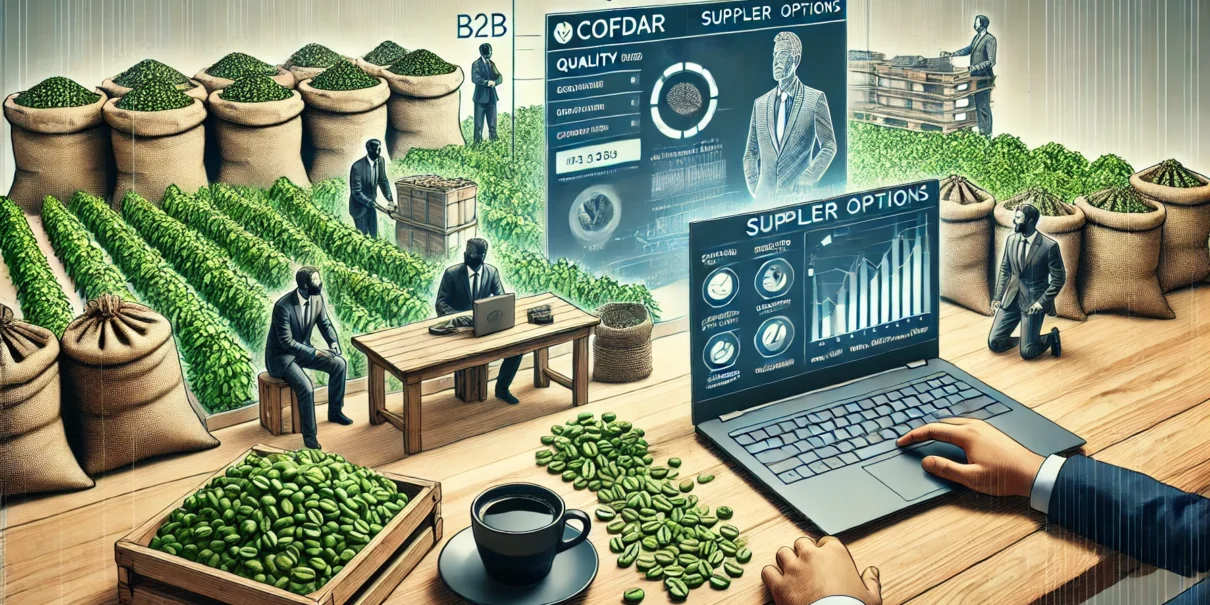The trade of green coffee beans is a vital part of the coffee supply chain. Buying green coffee beans in bulk between businesses (B2B) requires a deep understanding of markets, sources, and processes to ensure quality, sustainability, and efficiency. This guide aims to help businesses make informed decisions when purchasing green coffee beans in large quantities.
What is Green Coffee?
Green coffee beans are the unroasted seeds from the coffee cherry. These beans are the raw material essential for coffee production and vary in quality and flavor based on several factors such as type, source, and processing method.
The Importance of Carefully Selecting Green Coffee Beans
- Quality of the Final Product: The quality of green coffee beans directly impacts the flavor and aroma of roasted coffee.
- Meeting Customer Expectations: Customers in the coffee industry need products that meet their expectations in terms of flavor and quality.
- Sustainability and Transparency: There is an increasing demand for products that are sustainable and transparent in their origin and processing.
How to Choose Green Coffee Beans in Bulk
1. Understanding Types of Coffee
- Arabica: Arabica beans are considered high-quality and have complex flavors with moderate acidity.
- Robusta: Robusta beans contain higher caffeine content and have a more bitter flavor, often used in commercial coffee and blends.
2. Source of the Beans
The flavors of green coffee beans vary significantly based on the geographical region where they are grown. Businesses should consider:
- Latin America: Coffee from Brazil and Colombia is known for its quality and balanced flavors.
- Africa: Ethiopia and Kenya are famous for coffee with fruity and floral notes.
- Asia: Indonesia and Vietnam offer beans with earthy and strong flavors.
3. Processing and Drying Methods
- Dry Processing: Results in sweet and complex flavors.
- Wet Processing: Produces clean and pure flavors.
- Honey Processing: A combination of both methods, providing a balance between sweetness and acidity.
Steps for Effective Green Coffee Bean Procurement
1. Evaluating and Choosing Suppliers
- Research and Evaluation: Evaluate multiple suppliers based on bean quality, sustainability, pricing, and logistics services.
- Samples: Request samples to assess the quality of the beans before making large purchases.
2. Negotiating Terms
- Pricing: Negotiate prices based on order volume and bean quality.
- Payment Terms: Agree on payment terms that suit both parties, such as upfront payment or payment upon delivery.
- Shipping Terms: Clearly define shipping terms to ensure timely and proper delivery of the beans.
3. Agreements and Contracts
- Long-Term Contracts: For ongoing partnerships, consider long-term contracts to ensure consistent supply.
- Quality Standards: Specify quality and grading standards within the contracts to avoid future discrepancies.
The Role of Cofdar Platform in Green Coffee Bean Procurement
The Cofdar platform plays a vital role in facilitating the procurement of green coffee beans between businesses. It offers several advantages that make the purchasing process more efficient and transparent:
- Access to a Wide Network of Suppliers: Cofdar allows businesses to access a vast network of reliable suppliers from various parts of the world, helping diversify bean sources.
- Internal Communication: Through internal messaging and direct communication with suppliers, businesses can request samples and assess bean quality before making large purchases.
- Safe Negotiations: The platform’s integrated negotiation tools enable businesses and suppliers to negotiate prices and terms securely and quickly.
- Shipment Management: Coordination with suppliers for shipment details ensures timely and optimal delivery of beans.
Tips for Businesses When Buying Green Coffee Beans
- Certifications: Ensure that the beans carry sustainability and quality certifications like Fair Trade, Rainforest Alliance, and Organic.
- Proper Storage: Store the beans in suitable conditions to maintain their quality.
- Tracking and Monitoring: Use tracking systems to ensure careful monitoring of shipping and quality processes.
- Flexibility: Be flexible and ready to adapt to market changes and bean availability.
Importance of Good Relationships with Suppliers
- Continuous Communication: Maintain open communication channels with suppliers to ensure all needs are met.
- Strategic Partnerships: Building strategic partnerships can enhance opportunities for obtaining high-quality beans at competitive prices.
Future Trends in Green Coffee Bean Procurement
With the increasing reliance on technology and innovation in the coffee industry, the procurement process for green coffee beans is expected to undergo significant developments including:
- AI and Data Analysis: To improve bean selection and demand forecasting.
- Sustainability Technologies: Rising demand for beans produced sustainably and eco-friendly.
- E-commerce: Using e-commerce platforms to streamline the purchasing process and enhance transparency.
Conclusion
Buying green coffee beans in bulk for businesses requires precision and strategic planning to ensure the best beans at the best prices. By following this guide, businesses can make informed decisions that enhance their product quality and meet customer expectations, ensuring sustainable success in the coffee industry. The Cofdar platform plays a crucial role in simplifying and improving this process, contributing to increased efficiency and transparency in the B2B green coffee market.





Leave a Reply